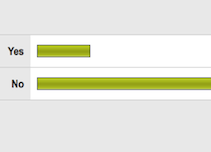
How will Twitter make money? It’s a question as old as time itself. Well, at least as old as Twitter itself. This weekend, film critic (and excellent Twitterer) Roger Ebert revisited the most obvious way Twitter could make money: charge to use it.
Ebert was surprised when a survey he found last week said that 0 percent (yes, zero) of Twitter users would be willing to pay for the service. With 1,900 responses, the survey was relatively small — but still, zero is zero. But it turns out the survey was “seriously flawed,” in Ebert’s words. How does he know? Because he sent out his own survey (a poll he created) to his nearly 200,000 followers.
Ebert wrote up a post on his Chicago Sun Times blog with the results. What did he find? Of the 3,901 who answered the poll (so more than double the original survey), 19.4 percent said they would be willing to pay for Twitter.
Ebert didn’t give any kind of variables in his poll, such as how much people would be willing to pay. He simply wanted to see if users would pay anything for it, because he would. And clearly he’s not alone.
While many people have (rightfully) argued over the years that charging for Twitter would ruin its main appeal (that anyone in the world can send these short message out at any time), Twitter could always offer some soft of pro accounts with more features or analytics. The company has stayed away from such ideas for users, but is going to be charging some brands for similar features. They’ve also stayed away from showing traditional ads in the stream, instead going with promoted tweets and trending topics.
But all of that seems to have Ebert a bit worried:
I have no idea how Twitter can pay for itself. I wouldn’t mind a reasonable number of ads in my stream. There are ads on almost every other site or service on the Web. If software analyzed my (public) steam and targeted ads I would theoretically find interesting, that would make sense.
I don’t have any answers. I succeeded only in proving 0.00% was too low.
As a company with over $150 million in funding, Twitter hasn’t been in a rush to make money. But they still will eventually need to make it. Data deals with Google, Microsoft, and Yahoo provide some revenue. And the aforementioned promoted tweets provide a bit more (as do the newer @earlybird ideas). But Twitter has yet to really nail their money-making scheme. And while Ebert’s ideas are nothing new, they do (obviously) make some sense.
But what I find most interesting in all of this is just how adamant Ebert is that he would pay to use Twitter. Previously, Ebert was on record as saying he would never join the service. Now, despite joining nearly three years after me, he’s almost sent as many tweets as I have (and I think I tweet a lot).
